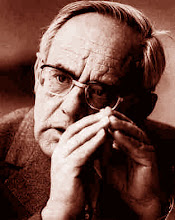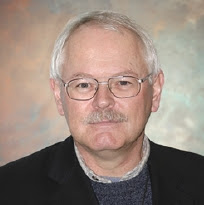
Recently, Associated Press religion writer, Eric Gorski reported a story about a generous Christian by the name of Cindy Fleenor. Each night she invited into her living room television preachers that told her,
“Be faithful in how you live and how you give; God will shower you with material riches.” And so the 53-year-old accountant pledged $100s a year to evangelist Joyce Meyer, to faith healer Benny Hinn and a local Tampa, Florida preacher. The blessings never came. Fleenor ended up borrowing money from friends and from payday loan companies just to buy groceries.
Eric Gorski reports that all the ministries mentioned here are among six major Christian television outreaches under scrutiny by Senator Charles Grassley. The probe is essentially calling into question those who preach the
"Gospel of Prosperity," or the notion that God wants to bless the faithful with earthly riches. Some argue that
“prosperity preaching” is a Biblically sound message. Others say it is a distortion of the truth. It has evolved from
"it's all right to make money" to it's all right for the pastor to drive a Bentley, live in an oceanside home and travel by private jet.
Oral Roberts and Kenneth Hagin — and later, Kenneth Copeland — trained tens of thousands of evangelists with a message that resonated with an emerging middle class, said David Edwin Harrell Jr., a Roberts biographer. Copeland is among those now being investigated. The teachings took on various names —
"Name It and Claim It," "Word of Faith," and
“the Prosperity Gospel.”But would the
“Prosperity Gospel” work, say for the 74,000 homeless living in Los Angeles, many of them Christians? There is no doubt that God wants to bless his followers. Jesus however, describes the nature of our blessings when he says,
“Blessed are the merciful, they shall obtain mercy.” (Matthew 5:7) When we are patient, kind, loving, forgiving, giving and merciful to the poor, the criminal, the orphan and the widow – we confirm God’s generous mercy upon ourselves by receiving His free gift of eternal life that we do not deserve. We get to go to heaven by God’s mercy! Heaven and eternal life are the blessings and riches that God has promised each of us.
When Jesus developed his preaching of compassion for the poor, there is no doubt he was acutely aware of the piercing Old Testament scripture of Proverbs 14:21 which says, "Anyone who despises his [poor] neighbor commits sin. But blessed is the person who is kind to the poor." Our blessings are eternal and spiritual – the best type – they are better than money! John tells us,
“We know that we have passed from death into life because we love the brethren. He who does not love abides in death.” (1 John 3:14)
When we give alms, show mercy, love and kindness to the poor and homeless, we have an opportunity to confirm God’s gift of eternal life. His blessings therefore are not temporal, but spiritual - the reward of eternal life with God the Father, our Creator. We don’t go to hell as each one deserves. Christ blesses us with adoption as sons of God. (Galatians 4:5) And so we discover that there are blessings for giving out of love, but it more than likely will not be a new car or winning the million dollar lottery.
 A chilly wind blows across the homeless plane
A chilly wind blows across the homeless plane Christian thinkers have agreed with the claim that one must love other people for themselves and not for an earthly reward. As Jesus Christ said “You have heard that it was said, ‘You shall love your neighbor and hate your enemy.’ But I say to you, love your enemies ... For if you love those who love you, what recompense will you have? Do not the tax collectors do the same?” (Matthew, 5:43-48; cf. Luke, 14:12-14; Acts, 20:35). Indeed the Christian manual Didache (c. 100) claims that the true Christian must give to everyone that asks without looking for repayment. Hence several Christians such as Clement of Alexandria (c. 150-215), Lactantius (c. 240-320), Basil (c. 330-379), Ambrose (c. 340-397), Jerome (c. 347-420), Augustine (354-430), John Cassian (c. 360-433), Dorotheus of Gaza (c. 505-565), and Gregory the Great (c. 540-604), as well as the Hindu text Bhagavad Gita (c. 500-200 B.C.E.), assert that one’s love is true only if one is willing to love someone who may not return one’s love.
Christian thinkers have agreed with the claim that one must love other people for themselves and not for an earthly reward. As Jesus Christ said “You have heard that it was said, ‘You shall love your neighbor and hate your enemy.’ But I say to you, love your enemies ... For if you love those who love you, what recompense will you have? Do not the tax collectors do the same?” (Matthew, 5:43-48; cf. Luke, 14:12-14; Acts, 20:35). Indeed the Christian manual Didache (c. 100) claims that the true Christian must give to everyone that asks without looking for repayment. Hence several Christians such as Clement of Alexandria (c. 150-215), Lactantius (c. 240-320), Basil (c. 330-379), Ambrose (c. 340-397), Jerome (c. 347-420), Augustine (354-430), John Cassian (c. 360-433), Dorotheus of Gaza (c. 505-565), and Gregory the Great (c. 540-604), as well as the Hindu text Bhagavad Gita (c. 500-200 B.C.E.), assert that one’s love is true only if one is willing to love someone who may not return one’s love.

 Not long ago HIA posted, “Preaching the Prosperity Gospel to the Homeless?” (see Thursday, January 3, 2008). The "Gospel of Prosperity," popular in America for decades now is the notion that God wants to bless the faithful with earthly riches and minimize suffering. On the surface, it’s a nice notion, but in reality not the life Jesus led or promised His followers. To the contrary, Jesus experienced suffering and so suffering is co-shared by His followers.
Not long ago HIA posted, “Preaching the Prosperity Gospel to the Homeless?” (see Thursday, January 3, 2008). The "Gospel of Prosperity," popular in America for decades now is the notion that God wants to bless the faithful with earthly riches and minimize suffering. On the surface, it’s a nice notion, but in reality not the life Jesus led or promised His followers. To the contrary, Jesus experienced suffering and so suffering is co-shared by His followers. For as long as the United States has sent its young men — and later its young women — off to war, it has watched as a segment of them come home and lose the battle with their own memories, their own scars, and wind up without homes. To the dismay of many Americans, Veterans make up 25 percent of homeless people in the United States, though they are only 11 percent of the general adult population, according to a recent VA homeless report, (see Tsunami Effect, Thursday, November 8, 2007).
For as long as the United States has sent its young men — and later its young women — off to war, it has watched as a segment of them come home and lose the battle with their own memories, their own scars, and wind up without homes. To the dismay of many Americans, Veterans make up 25 percent of homeless people in the United States, though they are only 11 percent of the general adult population, according to a recent VA homeless report, (see Tsunami Effect, Thursday, November 8, 2007).






















 In the 1980s, authors Waterman and Peters set out to discover success in American business. They asked the question in their book In Search of Excellence, “Is anyone doing it right and are they doing it right here in America?” Today, we ask the same question, but with a new twist, “Are any Americans following the Lord in His call to serve the poor and are they doing it right now?” A resounding yes! Sister Antonia Brenner rocks.
In the 1980s, authors Waterman and Peters set out to discover success in American business. They asked the question in their book In Search of Excellence, “Is anyone doing it right and are they doing it right here in America?” Today, we ask the same question, but with a new twist, “Are any Americans following the Lord in His call to serve the poor and are they doing it right now?” A resounding yes! Sister Antonia Brenner rocks.

_-_Dante_And_Virgil_In_Hell_(1850)%255B1%255D%2B(2).jpg) The problem of moral evil (when bad things happen because of human actions) has been a long-standing philosophical debate. Responding to "Hell is Others?" (see Saturday, January 5, 2008) Anonymous said... "From what I remember from Existentialist studies, Jean Paul Sartre actually said "hell is other people," meaning that others make our lives a living hell. The reference is from the play "No Exit." I personally believe that Sartre is right. Hell is other people. People can make our lives a living hell. I don't believe it has anything to do with being self-centered or with the sins that you've mentioned. It has more to do with how people treat us."
The problem of moral evil (when bad things happen because of human actions) has been a long-standing philosophical debate. Responding to "Hell is Others?" (see Saturday, January 5, 2008) Anonymous said... "From what I remember from Existentialist studies, Jean Paul Sartre actually said "hell is other people," meaning that others make our lives a living hell. The reference is from the play "No Exit." I personally believe that Sartre is right. Hell is other people. People can make our lives a living hell. I don't believe it has anything to do with being self-centered or with the sins that you've mentioned. It has more to do with how people treat us."

 Part I
Part I_-_Dante_And_Virgil_In_Hell_(1850)%5B1%5D+(2).jpg) The famous french philosopher John-Paul Sartre once said, “Hell is others!” (Photo, Dante and Virgil in Hell circa 1850 by the artist William-Adolphe Bouguereau) His philosophical thinking obviously promotes self-centeredness. Biblical based theism would reverse Sartre’s statement and say, “Hell is self” meaning, “selfishness.” The sins of egoism, pride and selfishness divide us from each other and thrust a person into isolation from God. Unchecked, it delivers a person into perpetual and mortal loneliness.
The famous french philosopher John-Paul Sartre once said, “Hell is others!” (Photo, Dante and Virgil in Hell circa 1850 by the artist William-Adolphe Bouguereau) His philosophical thinking obviously promotes self-centeredness. Biblical based theism would reverse Sartre’s statement and say, “Hell is self” meaning, “selfishness.” The sins of egoism, pride and selfishness divide us from each other and thrust a person into isolation from God. Unchecked, it delivers a person into perpetual and mortal loneliness.


















